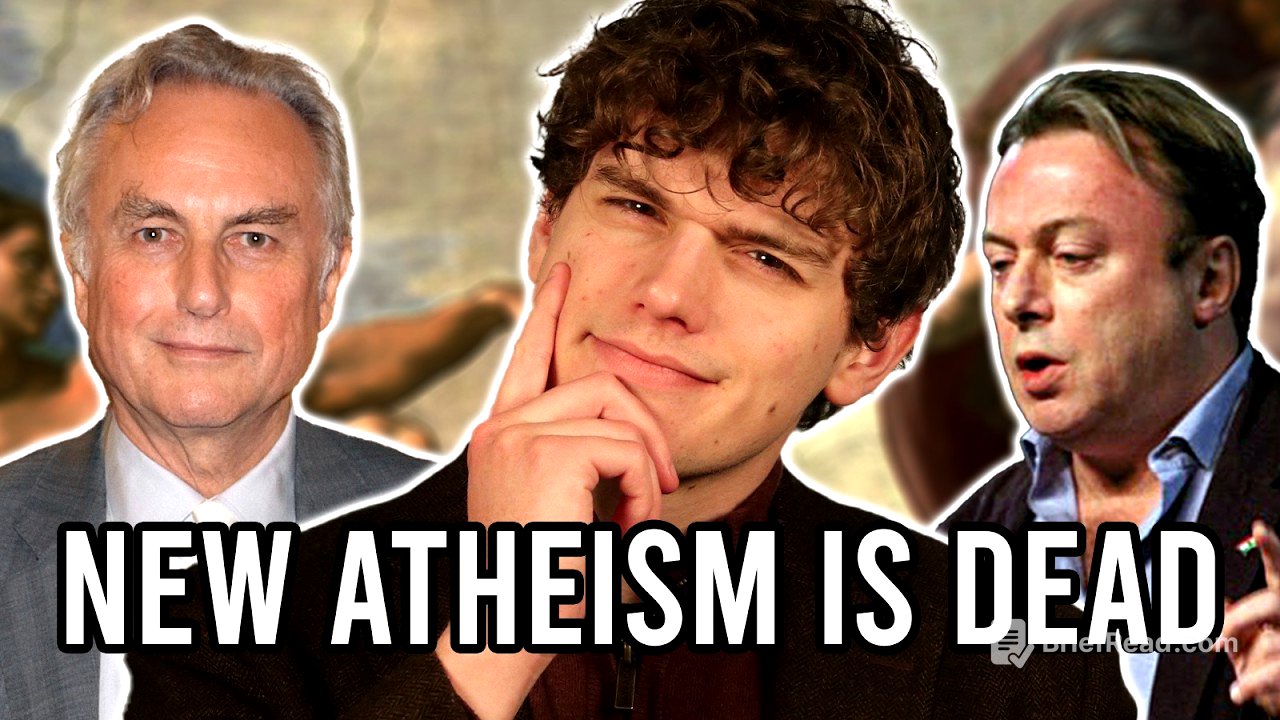TLDR;
This video provides a philosophical analysis of the New Atheism movement, examining its core beliefs, strengths, weaknesses, and its impact on contemporary religious debate. It argues that while New Atheism successfully challenged certain religious claims and taboos, it also suffered from oversimplifications, strawmanning, and a lack of intellectual humility. The video concludes by advocating for a more nuanced and humble approach to discussing the existence of God and the role of religion in society, recommending several books for further exploration.
- New Atheism's core tenets include strong atheism, anti-theism, and confidence in reason.
- It successfully challenged creationism, biblical literalism, and the idea of God's direct intervention.
- New Atheism was criticized for strawmanning religious arguments and lacking intellectual curiosity.
- The future of religious debate requires humility, engagement with stronger arguments, and recognition of diverse positions.
New Atheism and Me [0:00]
The author reflects on their early fascination with New Atheism, particularly after reading "The God Delusion" at a young age, which led them to passionately argue against religious belief. Over time, their views have shifted towards a more skeptical perspective on New Atheism while maintaining agnosticism. With the decline of New Atheism as a prominent movement, the author proposes a philosophical examination of its beliefs, shortcomings, and future implications for both believers and non-believers. The author acknowledges the video is not comprehensive and encourages viewers to approach the topic with critical thinking.
How to Spot a New Atheist [3:18]
New Atheism is characterized not just by disbelief in God, but by specific attitudes and publications. The movement's foundational texts include works by Sam Harris, Daniel Dennett, Richard Dawkins, and Christopher Hitchens. A key tenet of New Atheism is the assertion that there are no good reasons to believe in God, a stronger claim than traditional skepticism, which simply argues it's reasonable not to believe. New Atheism also involves anti-theism, the belief that religion is a negative influence on society, and a strong confidence in the power of reason to guide morality and understanding. The author points out that New Atheism arose from a frustration with the perceived immunity of religion from critique, and it has largely succeeded in making discussions about religion more open.
The Strengths of New Atheism [10:43]
New Atheism effectively targeted specific arguments, such as creationism and fundamentalist interpretations of scripture. It successfully challenged the argument from design, using evolution by natural selection to explain the appearance of intention without divine intervention. Similarly, New Atheists critiqued biblical literalism by highlighting inconsistencies with historical data. Their arguments were strongest when addressing linear causal arguments for God, such as claims of direct intervention or miracles, advocating for rational explanations over divine ones. The movement also played a crucial role in opposing the inclusion of intelligent design in school curricula and addressing religiously motivated violence and repressive practices. Despite criticisms, New Atheism offered valuable critiques and stimulated engaging discussions, such as Dawkins' challenge to explain God's existence and Dennett's exploration of religious psychology.
New Atheism Challenged [18:12]
New Atheism faces criticism for misrepresenting religious claims and arguments, particularly by Catholic philosopher Ed Faser. Faser argues that New Atheist texts demonstrate ignorance of the history and theology of the Western religious tradition and offer shallow philosophical analyses. The author notes that New Atheists often strip arguments like Aquinas's five ways of their original context, making them appear weaker. The author also criticizes Dawkins' response to the first way, the unmoved mover, for oversimplifying Aquinas's concept of motion as change and sustainer rather than mere movement. The author also notes that New Atheists are open about the cursory nature of their theological investigations, with Dawkins conceding that his book targets the average believer rather than theologians. The author distanced themselves from New Atheism due to its shift from open inquiry to closed-mindedness, where atheism became a package deal with other philosophical positions and ridicule replaced argumentation.
The Future of Religious Debate [26:54]
The author suggests that the debates surrounding New Atheism have followed a natural pattern of prominence, excess, and counter-response, leading to intellectual development. While New Atheism has diminished the intellectual respectability of young earth creationism, it has also paved the way for more sophisticated theistic arguments. Moving forward, the author calls for humility in addressing arguments for and against God's existence, urging engagement with the strongest versions of each other's positions. The author emphasizes the need to recognize the diverse positions within both theism and atheism, beyond the limited scope of the New Atheist debates. The author advocates for a more peacemeal approach to discussing God's existence, acknowledging the complexities and nuances often hidden by simple questions. Despite its flaws, the author appreciates New Atheism for bringing attention to religious discourses and making some genuinely good points, potentially enabling more nuanced conversations about God.









